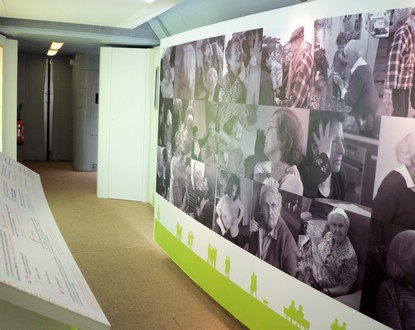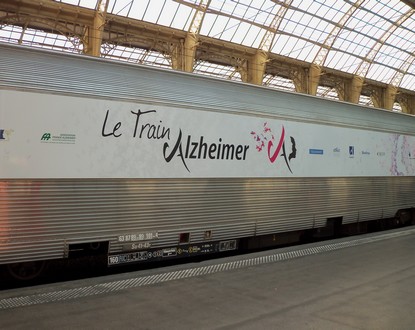The Tour de France of the Alzheimer train, which aims to raise awareness about this still little-known disease, stopped at Nice-Ville station. A sort of interactive museum in a long space, to teach us about this disease affecting nearly 800,000 French people.

A train stopped in the station for nearly 10 hours is not common. That it should not be blamed on the SNCF is even less so. Yesterday at Thiers station, the Alzheimer train allowed the general public to get a first look at the disease. Its educational value is expressed in different ways: visually and audibly (one can hear Nicolas Sarkozy in Sophia-Antipolis in 2008 making the fight against Alzheimer’s disease a flagship initiative).
There are also numerous tools: computer-based, surveys collected. Because this train is also a place of sharing and listening, the perception of the disease by the French people, as well as their expectations, are studied on board. Through the carriages, one discovers the disease step by step, seeing it take hold. The different stages of the disease, its progression, its possible management. Sounds are activated on video screens, one sees elderly people testifying. Instructions about patient care, their suffering and difficulties, things to which one unfortunately does not have access outside this railway context.
Technology at the service of the patient.
Currently estimated at around 800,000, the number of Alzheimer’s patients is expected to reach 1.2 million in 2020 and 2.1 million in 2040. Under these conditions, it became urgent to do something. The Complementary Retirement Institution for Household Employees (IRCEM) was present on the train to present “Quartersperanto.” This initiative aims to assist people intervening at the homes of individuals in dependency situations. It relies on new technologies and certain computer programs to succeed. Among them, the famous memory game, on a touch screen, is intended to train memory and therefore delay its loss.
But if the appeal of the medium is undeniable, the playful aspect represents only a small part of their task. Projects putting technology at the service of dependent individuals are deployed. The presence of the IRCEM is thus part of a broader reflection. Home care assistants, in the broadest sense, will soon be able to communicate with each other via a social network, perhaps one day even remotely control medication intake via an electronic device weighing the pills. In addition to undergoing professionalization, the job is structured to prepare them to be confronted with individuals at the end of life and diseases like Alzheimer’s. Progress that will not be a luxury to facilitate the living conditions of both parties. “This could be a solution to promote healthy aging and delay entry into nursing homes,” explains Eric Savary, Deputy Director of Customer Relationship Development at IRCEM.



